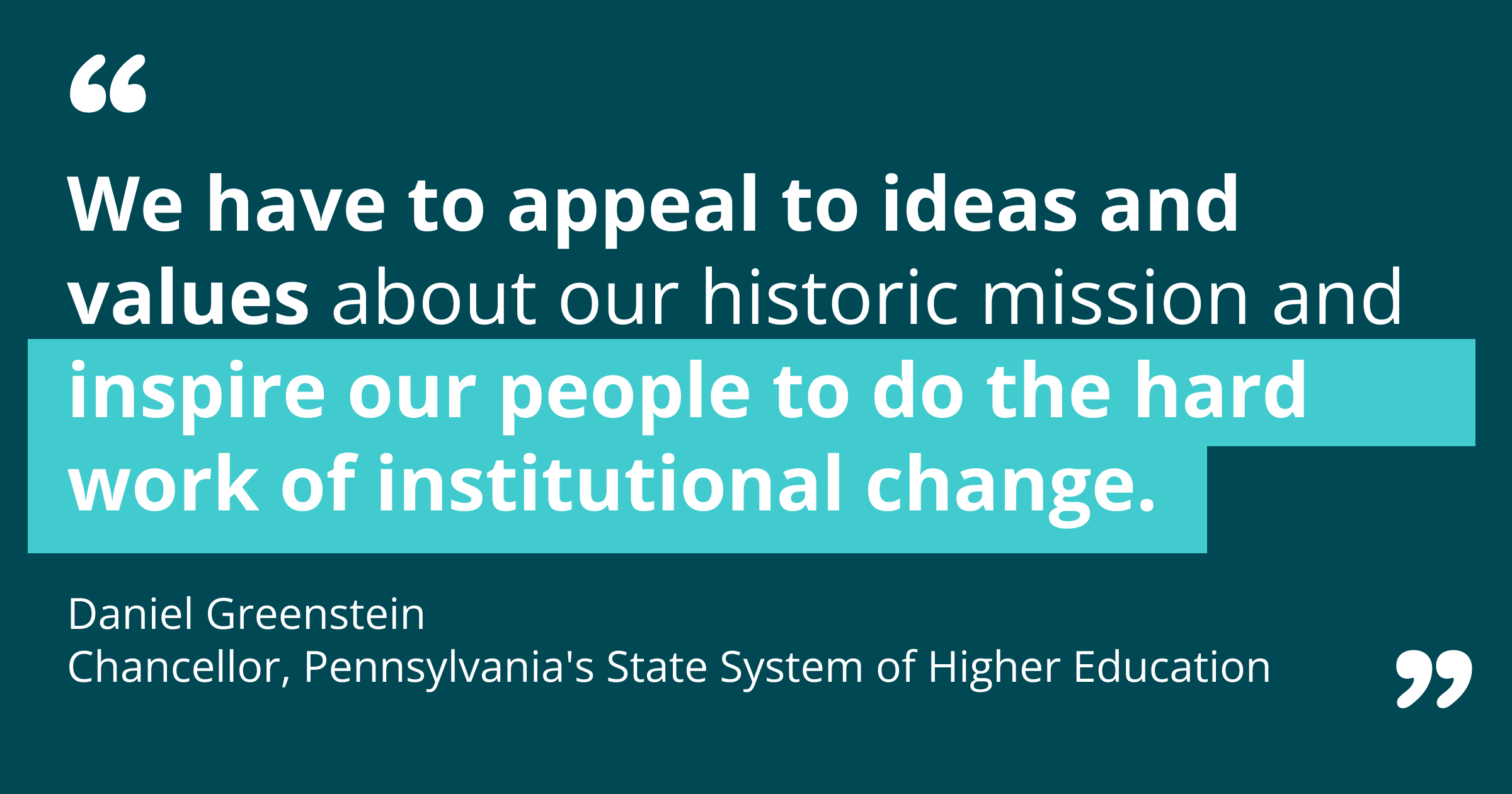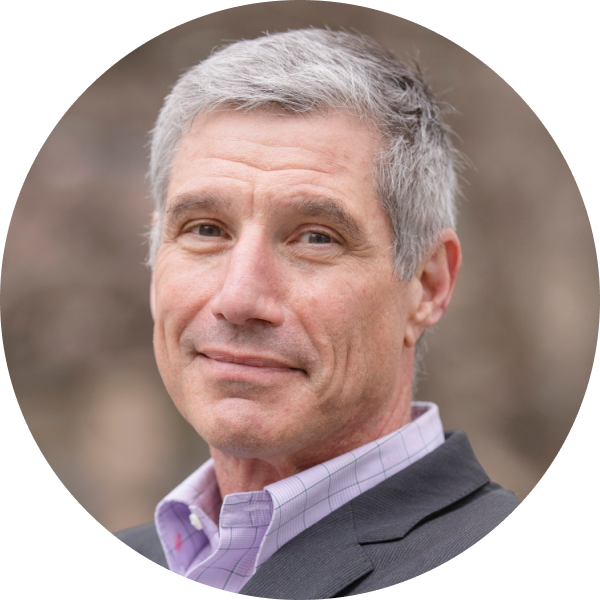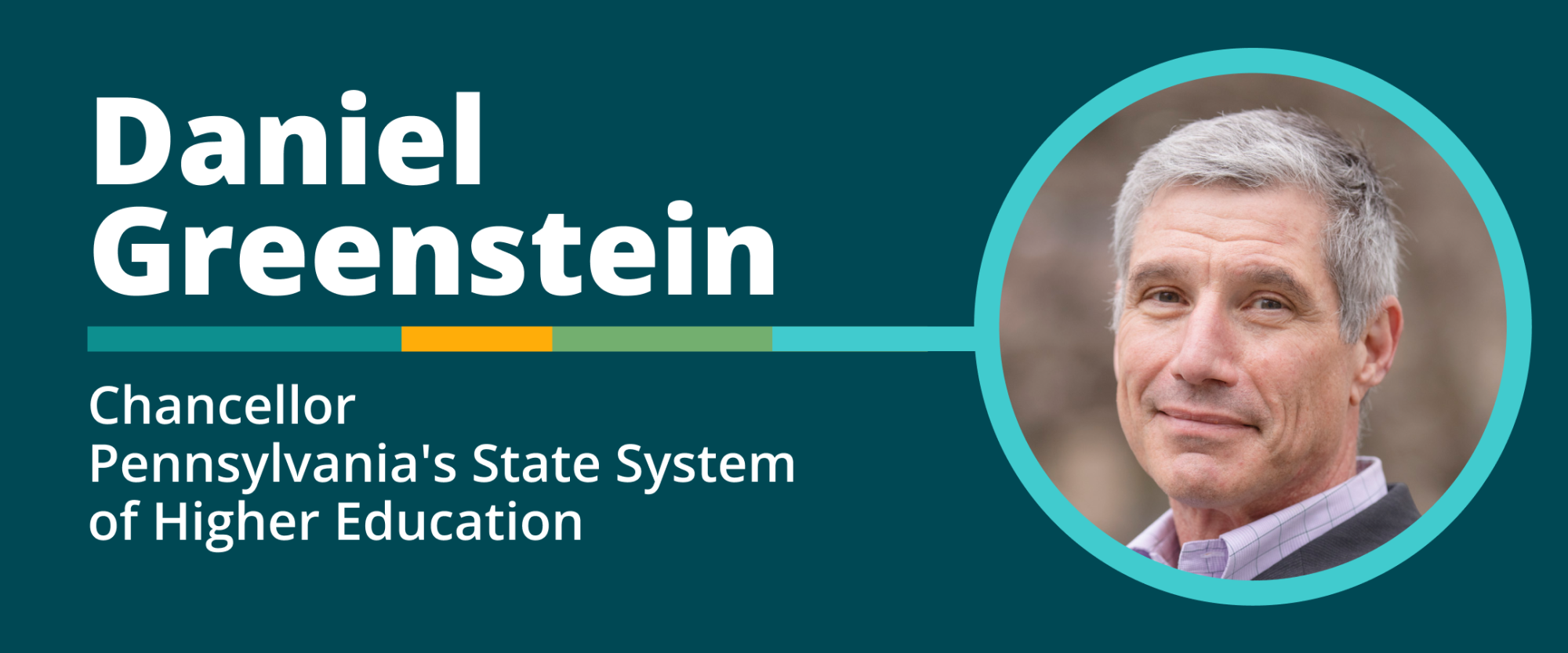The Pennsylvania State System of Higher Education (PASSHE) is in the process of transforming from a struggling university system to an innovative statewide model of 21st-century higher ed. Dr. Daniel Greenstein, Chancellor of PASSHE since 2018 and the architect of this transformation, joined the University Innovation Alliance (UIA) on our Weekly Wisdom Podcast to discuss sharing his team’s lessons with the higher ed community, some basics of redesigning a university system, tips for those initiating a redesign, navigating team buy-in, and the relationship between efficiency and innovation.
Sharing Education Leadership Lessons as They Happen
It's unusual for someone actively driving a transformation to synthesize and share what they're learning, yet Chancellor Greenstein does exactly that by publishing blog posts. He credits this strategy to his time with the Bill and Melinda Gates Foundation:
“The work at Gates was to solve a particular problem, and then support widespread adoption of those findings. It was finding ways of improving post-secondary outcomes for marginalized students, low-income students, students of color. It's not enough to know what works, but to adopt those strategies because they're good for students and the universities helping them succeed. When I came to the Pennsylvania State System in 2018, I adopted our ecosystem of 14 universities, regional publics serving predominantly low- and middle-income students. Those universities were facing financial pressures, underfunding from the state, enrollment decline, the demographic cliff.
“Are there ways to work with these vital engines of social mobility and economic development, and carve out a viable and sustainable future for them? If you're going to try it, you might as well give lessons back to the field, good and bad, things that work, things that don't. The blog derives from that real passion about paying it forward in the hope that others can build on or at least short circuit those lessons and not make quite as many mistakes.
“It was originally going to be a book. Then I gave a conference presentation six months ago and realized that people don't want your stupid words in a book. They want lessons. So, it's one lesson per blog. And I attach tangible assets – tools, templates, policies, approaches – so that people can download, adapt, adopt, whatever. The problems we're facing are not unique. We’re trying to synthesize the generalizable lessons and return them to the field.”
Chancellor Greenstein mixes his own experiences with insights from experts for a bigger picture:
“I try at the end of every blog to say, ‘How well does this really work?’ That's the most intellectually challenging part, but it's also the part that I enjoy. It's an insight that I was provided in conversations with folks who do this stuff really well. This reflects radical collaboration across the industry, like what you do at the UIA, building networked improvement communities to accelerate the pace of change. I think it gets more important as the problems we face become more challenging and urgent that we solve them for the benefit of the country.”
How to Redesign a University System
Chancellor Greenstein admitted that transforming an entire system started from unlikely places:
“I have blogs about building drains and toilets. You can't launch the interesting, innovative work until you've got the foundational tools in place. You need good governance and accountability. You need to build data-driven culture with great data resources and people who routinely use them in decision making. You can't assume that your organization is up to all that. That time invested in mending drains and toilets was a big surprise to me. It required so much discipline, consistency, staff time investment, et cetera.”
The UIA has noticed a tendency in higher ed to underestimate the difficulties and slowness of institutional change. The most effective leaders can empathize with how change impacts people’s lives and create space for them to understand and accept it. Chancellor Greenstein suggested some resources for this:
“There are a couple of great books, one by Chip and Dan Heath called Switch, which addresses the emotional aspects of change leadership. Another one is The Change Monster by Jeanie Daniel Duck. She talks about being available and connecting with your people at an empathic level. They're going to be afraid, exhilarated, angry, frustrated, sometimes all at the same time. You have to understand that's real, let it happen, and design around it.”
3 Leadership Lessons
We asked Chancellor Greenstein how he’d coach himself if he could reach back five years to the beginning of his transformation work with PASSHE. He offered his former self three tips:
“Go slow to go fast. Mend your drains and toilets, just accommodate. It's going to take time. Just get on it.
“Another one is about governance. We're a system of independent universities. You want to engage the presidents in this enterprise-wide effort of redesigning the system's educational business models to stop the serious financial decline. Think of them as co-investors in strategy and execution, because it's a single bank account. If one university has trouble paying its bills, the others have to bail it out. So, creating the collaborative space for horizontal accountability is important for getting people to manage their budgets sustainably. As they did that, we recognized the key drivers of financial decline and began identifying and documenting practices that seemed to work. Then we turned them into playbooks and held each other accountable for implementing them. Now I’m thinking, ‘If we had known to build that network improvement community on day one, we'd be up to nine or ten playbooks about these key drivers.’
“I'll give you one other. We integrated six universities into two and went through a detailed, inclusive, contentious, essential process to ensure that students, particularly at our smaller rural institutions, had access to full breadth of academic programming. And hats off to the people who did and are continuing to do the work. It's a long journey, blending all those organizational, educational, and business processes. It's not clear if the capabilities you have for running universities are the capabilities you need for that kind of merger. I'm not sure what we would've done differently. Probably spent more time thinking about organizational capabilities and strengthening them upfront as opposed to throwing support at a fix afterwards.”
Committing to System Transformation
In the UIA’s ten years of helping higher ed leaders drive change, we’ve noticed that all initiatives, small and large, receive similar levels of recognition, creating a bias toward undertaking what requires less time. Chancellor Greenstein addressed the challenges of committing to institution-level work:
“Most universities and colleges are legacy-centric, not built to undertake massive transformation. So, you've got to enlist a lot of folks, align them around the mission, and hold them accountable for good outcomes. You're asking people to step into leadership roles and change their own and their colleagues’ behaviors and practices. Historically, we’re engines of social mobility and economic development providing that bridge to opportunity for people who otherwise would not have one. People who work in higher ed are driven by that mission. It is a profound conservatism. And what we’ve undertaken with transforming PASSHE is radical change. We have to appeal to ideas and values about our historic mission and inspire our people to do the hard work of institutional change.”

He added that within a state university system, there will always be an element of state politics:
“Legislators and boards of governors have a role in the public institutions. Agreeing on everything is a high bar, but trying to get something fixed or improved is really important. Pennsylvania has a very closely divided government from a party perspective, so you've got to build a coalition at the middle. What enables us to do that is our role in workforce and economic development. People get it. Where we’re going to get our nurses, teachers, IT professionals, and manufacturers from is a big deal.”
Balancing Innovation and Efficiency
We asked Chancellor Greenstein how he fosters a culture of continuous learning and innovation among faculty and staff while also pushing a culture of data, which is about efficiency, accountability, and transparency.
“Data is certainly about efficiency, but it's about driving outcomes that include learning. You're using data for testing innovations or approaches to constantly refine and improve them. This is hard in financially constrained institutions. We don't have a lot of spare cash or staffing. So, how do you empower employees to figure things out in cash-strapped organizations where everybody's working flat out? It’s a challenge. Leaders don’t want to let go because there's a fear of over expenditure. But that's exactly how we need to foster innovation: finding time for people to explore, learn, and engage in dialogue about improving their practice. I read this book called All-in on AI about the organizations which are successful with AI. It was written a few years ago, but I’m sure those are the organizations deliberately giving people time, empowering employees, supporting them with training and resources to play with AI, and having them feed back into the solutioning process, environment, and team.
“Those of us in higher ed have to figure out the innovation piece if we're going to become that learning organization, which will be so important in finding paths, not just for our institution’s sustainability, but more importantly for student success.”
Note: This interview in the Weekly Wisdom Series originally aired on July 8, 2024 as part of the University Innovation Alliance’s Innovating Together Podcast, appearing live on Facebook, Twitter, and LinkedIn
Resources Mentioned in This Episode
- The Pennsylvania State System of Higher Education (PASSHE)
- Dr. Daniel Greenstein
- Dan Greenstein’s blog posts: The Power and Promise of Higher Education
- Bill and Melinda Gates Foundation
- Switch: How to Change Things When Change Is Hard by Chip and Dan Heath
- The Change Monster: The Human Forces that Fuel or Foil Corporate Transformation and Change by Jeannie Daniel Duck
- All-in on AI: How Smart Companies Win Big with Artificial Intelligence by Thomas H.Davenport and Nitin Mittal
Bios of Guest and Co-Hosts

Dr. Daniel Greenstein became the fifth chancellor of PASSHE on September 4, 2018, serving as chief executive officer of Pennsylvania’s public university system, which enrolls more than 80,000 degree-seeking students and thousands in certificate and career-development programs. Chancellor Greenstein is leading a system-wide redesign effort focused on increasing opportunities for students – including those in underserved populations – while enhancing the universities’ financial sustainability. He previously led the Postsecondary Success strategy at the Bill and Melinda Gates Foundation, working with other innovative higher education leaders across the country on initiatives to raise educational-attainment levels and promote economic mobility, especially among low-income and minority students. He developed and implemented a national strategy for increasing the number of degrees awarded and for reducing the attainment gaps among majority and non-majority students at U.S. colleges and universities. Before joining the Gates Foundation, Dr. Greenstein served as Vice Provost for Academic Planning and Programs for the University of California (UC) system, in which he oversaw system-wide academic planning and programs, including the UC Press; the California Digital Library; the Education Abroad Program; internship programs in Washington, D.C., and Sacramento; and UC Online Education. Dr. Greenstein has created and led several internet-based academic information services in the U.S. and U.K., and served on boards and acted in strategic consulting roles for educational, cultural heritage, and information organizations. He began his academic career as a senior lecturer in modern history at Glasgow University in Scotland. He holds both bachelor's and master's degrees from the University of Pennsylvania and a D.Phil. from the University of Oxford. An enthusiastic cyclist, Dan and his wife, Melissa, have two children.

Co-Host: Bridget Burns, Executive Director, University Innovation Alliance
Dr. Bridget Burns is the founding Executive Director of the University Innovation Alliance (UIA). For the past decade, she has advised university presidents, system chancellors, and state and federal policy leaders on strategies to expand access to higher education, address costs, and promote completion for students of all backgrounds. The UIA was developed during Bridget’s tenure as an American Council on Education (ACE) Fellowship at Arizona State University. She held multiple roles within the Oregon University System, including serving as Chief of Staff and Senior Policy Advisor, where she won the national award for innovation in higher education government relations. She was a National Associate for the National Center for Public Policy and Higher Education, and has served on several statewide governing boards including ones governing higher education institutions, financial aid policy, and policy areas impacting children and families.
About Weekly Wisdom
Weekly Wisdom is an event series that happens live on Facebook, Twitter, and LinkedIn. It also becomes a podcast episode. Every week, we join forces with Inside Higher Ed and talk with a sitting college president or chancellor about how they're specifically navigating the challenges of this moment. These conversations will be filled with practicable things you can do right now by unpacking how and why college leaders are making decisions within higher education. Hopefully, these episodes will also leave you with a sense of optimism and a bit of inspiration.
Rate, Review & Subscribe
Learn why hundreds of people have rated this new podcast 5 stars! Please join others and rate and review this podcast. This helps us reach and inform more people -- like you -- to help increase the number and diversity of college graduates in the United States.
Click here, scroll to the bottom, tap to rate with five stars, and select “Write a Review.” Then be sure to let us know what you loved most about the episode! Also, if you haven’t done so already, subscribe to the podcast. We’ll be adding a bunch of bonus episodes to the feed and, if you’re not subscribed, there’s a good chance you’ll miss out.

